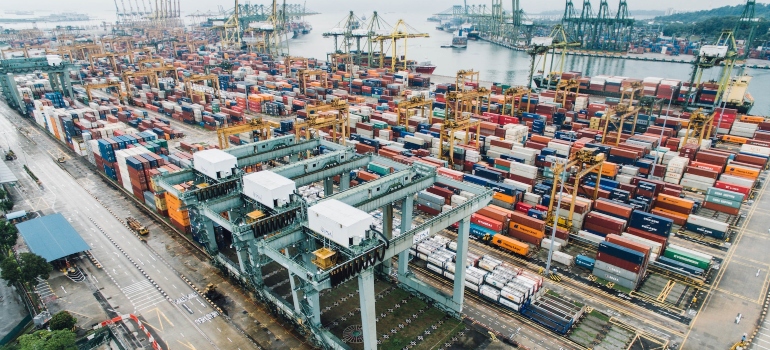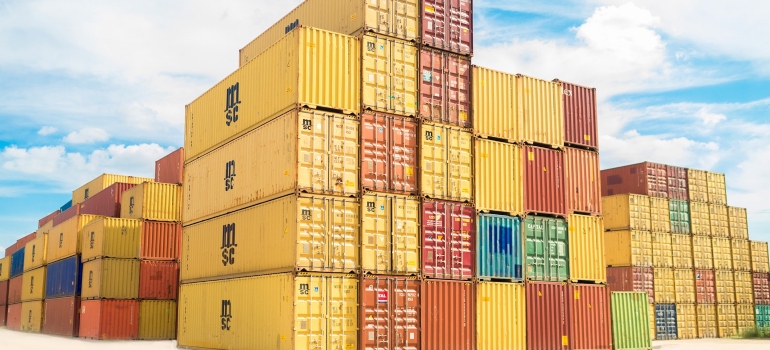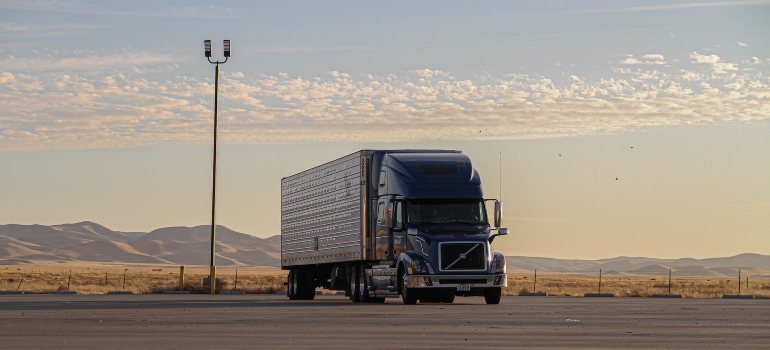Cargo Safety Measures: Protecting Goods on the Move
As the economy slowly gets back on its feet, global shipping is gradually transitioning back to normal. As the backbone of today’s economy, shipping is always evolving and striving to improve. In a world where swift deliveries are the norm, the emphasis on cargo safety measures has magnified. Each package represents a bond of trust, whether a sentimental heirloom or a pivotal business consignment. At Peasley Moving & Storage, we’re deeply attuned to the complexities of modern transportation and thus offer you the following guide. As the pace of global commerce quickens, so does the need for increased safety – because precious cargo can never be safe enough!
Imperatives and Challenges of Cargo Safety
Recent statistics reveal that approximately 30% of all freight damages occur during transit. This stark number underscores the pressing threats lurking in every shipment’s journey, whether by land, sea, or air. However, the question that arises is: Why is it essential to prioritize cargo safety measures? Here’s a list of challenges commonly faced in ensuring cargo safety:
- Environmental Conditions: Exposure to extreme weather, temperature fluctuations, and humidity can pose risks to cargo, especially sensitive or perishable items.
- Theft and Pilferage: Cargo is often at risk of theft or unauthorized access during transit or while in storage facilities.
- Damage During Handling: Improper handling during loading, unloading, and transportation can lead to physical damage to the cargo.
- Regulatory Compliance: Adhering to diverse and changing international and local regulations can be complex, especially when transporting across borders.
- Logistical Coordination: Coordinating the various stages of transportation, from origin to destination, poses challenges in timing, routing, and resource allocation.
- Technological Failures: Dependence on technology for tracking and managing cargo can lead to vulnerabilities if there are system failures or cyber-attacks.
- Inadequate Packaging: Insufficient or inappropriate packaging can fail to protect cargo from damage or contamination.
- Transportation Hazards: Risks associated with the mode of transport, such as maritime accidents, road collisions, or air freight issues.
- Human Error: Mistakes made by personnel involved in the shipping process can lead to mishandling, misrouting, or loss of cargo.
- Customs and Inspection Delays: Delays due to customs clearance and inspections can lead to extended transit times and potential damage, especially for time-sensitive shipments.
- Communication Gaps: Miscommunication among the various stakeholders involved in the shipping process can lead to errors and inefficiencies.
- Cargo-Specific Challenges: Different types of cargo, such as hazardous materials or oversized items, present unique safety challenges that require specialized handling and expertise.
Moreover, damaged cargo doesn’t just signify financial losses. For businesses, it can tarnish their reputation, erode customer trust, and lead to time-consuming disputes. For instance, imagine a renowned art gallery receiving a priceless painting only to find it damaged upon arrival. The aftermath isn’t just about monetary compensation but the irreplaceable loss of a masterpiece and the potential distrust from future partners.

The Diversity of Cargo: What Are You Shipping?
Each cargo has its own story. From fragile antiques to time-sensitive pharmaceuticals, recognizing the nature of what you’re transporting is of the greatest importance. For instance, freight shipping Boise companies might see diverse goods, from electronics to agricultural products. This diversity calls for varying safety standards and precautions.
Consider the transportation of hazardous chemicals. These demand stringent safety protocols, specialized containers, and regular monitoring. On the other hand, shipping delicate glassware would emphasize cushioning, padding, and shock-proof packaging more. Hence, understanding your cargo’s unique needs ensures its safety at every step.
The Necessity of Secure Packing
One of the primary determinants of cargo’s safety during transit is its packaging. Properly packed goods can withstand the routine jolts, vibrations, and occasional rough handling that come their way. Investing in high-quality packaging materials isn’t just a suggestion; it’s a necessity. Similarly, tailored crating for uniquely shaped items, like musical instruments or sculptures, provides an additional layer of security. The fit matters; ill-fitted packaging can prove to be as harmful as no packaging at all.
Furthermore, clear communication is essential. Imagine a handler unaware of a package’s fragility due to the absence of labels. The result? Potential damage from rough handling. Thus, proper labeling acts as the first line of defense, guiding handlers and ensuring they treat your cargo with the care it demands.
To seal the deal, integrating tamper-proof seals guarantees that your goods remain untouched and uncompromised. These seals act as deterrents against potential thefts and unauthorized access, especially during long hauls or overnight stops. Adhering to these cargo safety measures, shippers take a proactive step towards ensuring that their goods reach their destination in pristine condition. After all, a shipment’s journey should be as seamless and secure as its final delivery.

Cargo Safety Measures in Modern Tech Protection
Transitioning to the 21st century, we’ve witnessed an incredible fusion of technology and traditional shipping methods. Gone are the days when one merely hopes for the best when sending cargo. Today, technological innovations provide a real-time glimpse into the journey of every shipment. Indeed, GPS tracking has transformed the landscape of cargo safety. Freight companies in Idaho showcased that many now utilize GPS to monitor their shipments. This tool provides shippers and recipients peace of mind, offering live updates on location, route deviations, and estimated arrival time.
Different Gadgets Help With Cargo Protection
Maintaining optimal temperature and humidity levels is important for perishable goods or sensitive pharmaceuticals. Modern cargo trucks have sensors that constantly monitor these parameters. Alerts are sent instantly if any deviations occur, allowing prompt corrective actions. Such proactive measures reduce the risk of spoilage, ensuring that goods arrive in the best possible condition.
Additionally, including impact and tilt sensors, especially for fragile cargo, is revolutionary. These sensors detect and record any undue shocks or tilts that might compromise the integrity of the contents. Lastly, electronic locks and seals have redefined cargo security. Unlike traditional locks, these gadgets can be remotely monitored and controlled. Any tampering attempts while shipping containers overseas are immediately flagged, ensuring the utmost security throughout the cargo’s journey.
Prioritizing Cargo Safety Measures in Vehicle Maintenance
Beyond technology, the physical vehicles transporting our precious cargo play an integral role. For a shipment to reach its destination safely, its transportation mode must be in prime condition. This is where the diligence of maintenance checks becomes non-negotiable.
Surprisingly, reports indicate that many cargo-related accidents stem from vehicle malfunctions. Be it a worn-out tire, a failing brake system, or a compromised suspension – any of these issues can lead to catastrophic results. Hence, reputable freight companies invest heavily in regular and thorough inspections. The goal? To preemptively identify and address potential problems.

Moreover, the type of vehicle chosen for transportation is equally significant. Specialized goods demand specialized vehicles. For instance, a delicate art piece and a batch of frozen goods can’t share the same transport space. While the former may require a climate-controlled, vibration-free environment, the latter needs a robust refrigeration system. Recognizing these nuances ensures that each cargo gets the specialized treatment it deserves.
Mastering the Handling: Cargo Safety Solutions
In the logistics sector, careful handling is essential for ensuring dependable deliveries. Each stage of a shipment’s route presents unique challenges, making it vital to equip handlers with appropriate knowledge and tools. Focusing on medical equipment, a field requiring exceptional accuracy, medical equipment shipping services providers must be well-equipped and knowledgeable. Inadequate handling can lead to financial losses and, more importantly, delay crucial medical interventions.
Moreover, modern cargo handling isn’t solely about manual strength. It’s about the judicious use of those tools and equipment. Whether it’s a forklift for a heavy pallet or a hydraulic jack for a delicate item, leveraging the right equipment is essential. This speeds up the loading and unloading processes and drastically minimizes the risk of damage.
Environmental factors further compound the intricacies of cargo handling. Picture this: a valuable shipment exposed to torrential rain or searing sunlight. The resulting damages can be visible and latent, affecting the cargo’s longevity and functionality. Hence, it’s essential to shield shipments from adverse weather conditions, especially during overnight halts.
Security, naturally, remains a concern. Recent data pointed out a concerning uptick in thefts during storage or stopovers. Employing surveillance, secure storage facilities, and trained security personnel become non-negotiable cargo safety measures, ensuring the cargo’s sanctity remains uncompromised.

Understanding Insurance and Risk
No matter how stringent the cargo safety standards are, there’s always a sliver of risk looming – from natural calamities, accidents, or unforeseen mishaps. Amidst these complexities, many businesses often search for container shipping companies to find localized solutions that offer quicker response times and more tailored services. For shippers, insurance becomes the buffer against these unpredictable events. This doesn’t just represent a financial safety net and underscores the industry’s shift towards a more proactive risk management approach.
Furthermore, understanding the factors that influence insurance premiums is essential. Typically, these include the cargo’s value, nature (fragile, perishable, hazardous), route, and the chosen mode of transportation. For instance, a delicate electronic gadget being air-shipped might attract a higher premium than a bulk consignment of textiles transported via road. Lastly, in the unfortunate event of cargo damage or loss, knowing the nuances of claiming insurance becomes imperative. Ensuring proper documentation, timely notifications, and accurate assessments are the key steps towards a successful claim.
Cargo Safety Measures and Compliance
Embarking on any shipping venture requires a keen understanding of the regulatory landscape. Ensuring cargo safety isn’t solely about physical protection. It also hinges on the alignment with laws, regulations, and international guidelines that govern the movement of goods across borders.
For instance, shipping perishables across continents demands adherence to strict temperature controls and timely deliveries. Failure to comply can lead not only to spoilage but also hefty fines and even blacklisting by certain jurisdictions. Therefore, any shipper or logistics provider must understand these nuances and craft cargo safety solutions around them.
Moreover, international shipping regulations continuously evolve. Regular updates, changing tariffs, and shifting alliances can dramatically alter shipping routes, costs, and requirements. Consequently, staying abreast of these changes and understanding their implications is paramount.
Advanced Training for Cargo Personnel
While equipment and technology form the backbone, the personnel’s expertise ensures a package’s safe journey. Continuous upskilling is vital. Workshops on the latest packaging techniques, handling fragile goods, or even managing hazardous materials can spell the difference between a successful delivery and a setback. Moreover, trained personnel can also act as the first line of defense against potential threats, recognizing signs of tampering or potential hazards. Investing in people, their skills, and their knowledge is beneficial and crucial for the industry’s evolution.

Embracing Sustainability and Innovation is the Future
Transitioning into the future, the shipping industry is poised to undergo transformative changes. A significant aspect of this transformation is the evolution of packaging materials. With the demand for sustainable solutions rising, many companies, including those seeking packing supplies in Boise, focus on environmentally friendly options. In cities like Boise, the emphasis on sustainable packing supplies is evident, reflecting a larger global trend.
Additionally, AI-driven route optimization promises faster deliveries and safer routes, avoiding regions prone to theft or natural calamities. Technologies like blockchain further the cause, offering unparalleled transparency in cargo movement. As we look ahead, the confluence of sustainability and cutting-edge technology paints a picture of a shipping industry that’s safer, greener, and more accountable than ever before.
Your Cargo’s Safety Should Always be a Priority
One truth stands tall: The journey of your cargo, from its origin to destination, is a complex picture painted with care, diligence, and expertise. Every shipment tells a story. For some, it’s a tale of entrepreneurial aspirations, with goods reaching global markets. For others, it’s a personal narrative, with treasured belongings moving across continents. Regardless of the plot, the theme remains consistent: the need for uncompromised safety. At the heart of this lie robust cargo safety measures. Incorporating meticulous handling, leveraging cutting-edge technology, understanding and navigating intricate regulations, and securing against uncertainties through insurance – each element plays its crucial role.
Reference: https://supplychainbeyond.com/true-cost-of-shipping-damage/

